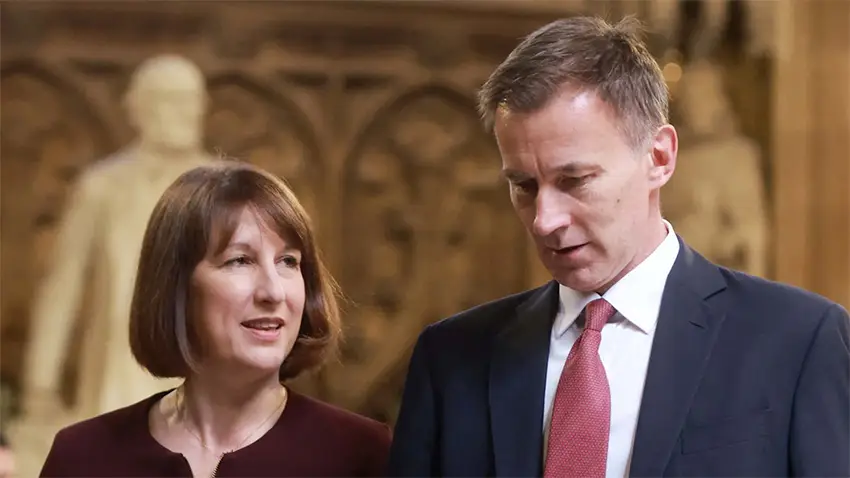Rachel Reeves has accused Jeremy Hunt of lying about the state of public finances, claiming a significant £22bn shortfall. This bold claim has ignited a fiery dispute with the Conservatives. Hunt vehemently denies the allegations, even writing to the head of the UK’s civil service, Simon Case, to challenge Reeves’ assessment. Meanwhile, Reeves stands firm, pointing out severe budgetary discrepancies.
The Accusation
Rachel Reeves has accused Jeremy Hunt of lying about the state of public finances. She claims that Hunt left a £22bn hole in the budget. This claim has sparked a heated dispute with the Conservatives.
Reeves said, “Jeremy Hunt covered up from the House of Commons and the country the true state of the public finances. He did that knowingly and deliberately.” She insists he lied during the election campaign about public finances.
Hunt, however, has rejected these claims outright. He even wrote to Simon Case, the head of the UK’s civil service, disputing Reeves’ assessment.
The £22 Billion Hole
Reeves pointed out a £22bn shortfall in the public finances. This led her to scrap several Conservative policies, including the much-discussed cap on social care costs and plans to build 40 hospitals.
Reeves also cancelled various road projects and cut winter fuel payments to 10 million wealthier pensioners, reversing a policy introduced by Gordon Brown. As a result, the number of pensioners receiving the payment will reduce drastically.
The winter fuel payment cuts alone are expected to save £1.5bn in the next financial year. Pensioners aged over 80 will be particularly affected, going from 11.4 million recipients to just 1.5 million.
Hunt’s Defence
Hunt isn’t staying silent. He wrote to Simon Case demanding an “immediate answer” to conflicting claims that could bring the civil service into disrepute. He argued that either senior civil servants got the spending plans wrong, or Reeves’ document was inaccurate.
Hunt’s concerns were echoed by the Conservatives, who pointed out past statements from Reeves’ team. Last autumn, Darren Jones, the Chief Secretary to the Treasury, had questioned Hunt on his plans for winter fuel allowances.
Jones had said that pensioners would be “deeply concerned” and “anxious” about threats to their incomes. This past comment adds another layer to the ongoing political drama over the budget shortfall.
Public Sector Pay Rise
Nearly half of the £22bn shortfall cited by Reeves, £9.4bn, is attributed to fully funding public-sector pay recommendations. This commitment includes pay rises for junior doctors and other public sector workers.
The cost to settle junior doctors’ pay alone is a hefty £350m. However, Reeves argued that this is minor compared to the economic damage caused by industrial action. She estimates that strikes cost the economy £1.7bn last year.
Reeves stated, “Public sector workers deserve pay rises in line with the private sector.” She emphasises that tough choices are necessary to restore economic and financial stability.
Scrapping the Social Care Cap
One major decision by Reeves was to scrap the planned cap on social care costs. This decision was driven by the need to restore economic stability and address the funding gap left by the previous government.
Reeves said, “What I inherited is a gap between what the previous government said it was going to spend and what it was actually spending of £22bn.” This discrepancy forced her to make urgent financial decisions.
Plans for social care were just one of many unfunded promises. Additional plans for new hospitals, transport spending, and other projects also lacked funding.
Difficult Decisions
Reeves reflected on the tough decisions she had to make. “There are lots of difficult decisions that I had to make yesterday, decisions that I didn’t want to make.” Her statement underscores the challenging financial situation.
Despite these sacrifices, Reeves remains optimistic about future reforms. She mentioned that Wes Streeting would continue to work with the sector to reform social care.
Reeves’ choices were guided by a detailed audit with Treasury officials. This audit uncovered that several promises made by the previous government had no funding attached. Therefore, urgent measures were essential to manage public finances effectively.
Political Drama
The political tension between Reeves and Hunt has grown considerably. Hunt’s letter to Simon Case highlights this ongoing battle. The confrontation is not merely about numbers; it encompasses broader political ideologies.
Hunt’s defence points to existing, conflicting claims within the civil service. He maintains that the spending plans approved by senior civil servants should be accurate.
Meanwhile, Reeves is adamant about the necessity of her decisions, which she believes are grounded in economic reality and a thorough audit of public finances.
In conclusion, the clash between Rachel Reeves and Jeremy Hunt over public finances is a significant political event. With Reeves exposing a £22bn shortfall and making tough financial decisions, the debate continues to draw attention. The outcome of this dispute could impact public policy and economic stability in the future.

